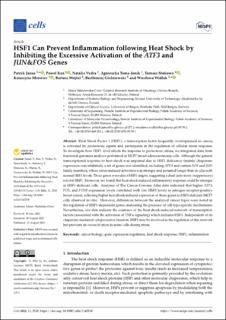| dc.description.abstract | Heat Shock Factor 1 (HSF1), a transcription factor frequently overexpressed in cancer, is activated by proteotoxic agents and participates in the regulation of cellular stress response. To investigate how HSF1 level affects the response to proteotoxic stress, we integrated data from functional genomics analyses performed in MCF7 breast adenocarcinoma cells. Although the general transcriptional response to heat shock was impaired due to HSF1 deficiency (mainly chaperone expression was inhibited), a set of genes was identified, including ATF3 and certain FOS and JUN family members, whose stress-induced activation was stronger and persisted longer than in cells with normal HSF1 levels. These genes were direct HSF1 targets, suggesting a dual (activatory/suppressory) role for HSF1. Moreover, we found that heat shock-induced inflammatory response could be stronger in HSF1-deficient cells. Analyses of The Cancer Genome Atlas data indicated that higher ATF3, FOS, and FOSB expression levels correlated with low HSF1 levels in estrogen receptor-positive breast cancer, reflecting higher heat shock-induced expression of these genes in HSF1-deficient MCF7 cells observed in vitro. However, differences between the analyzed cancer types were noted in the regulation of HSF1-dependent genes, indicating the presence of cell-type-specific mechanisms. Nevertheless, our data indicate the existence of the heat shock-induced network of transcription factors (associated with the activation of TNFα signaling) which includes HSF1. Independent of its chaperone-mediated cytoprotective function, HSF1 may be involved in the regulation of this network but prevents its overactivation in some cells during stress. | en_US |

